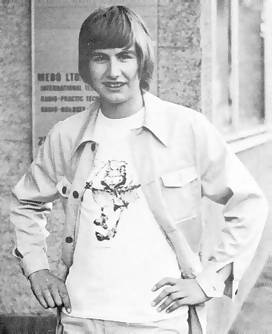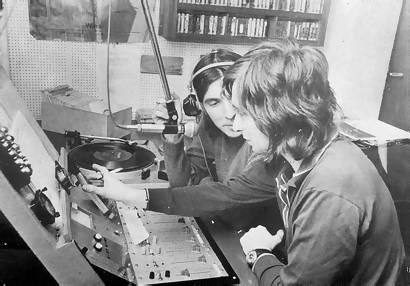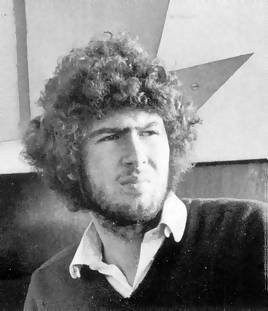When Radio Northsea International closed down in September 1970, the DJs had read out a statement saying that the closure was voluntary and was being done so that the Dutch Government would not
“attempt to close down Radio Veronica, so dearly loved by the people of Holland for the past ten years”. At first sight, this appeared to be a generous and magnanimous gesture. In fact it was nothing of
the sort. Northsea was not closing voluntarily. After a financially disastrous year, it had simply run out of money. It was being paid to suspend operations by its rival. Radio Veronica was handing over one million
guilders to Mebo Ltd, RNI's owners, for the papers to the Mebo II and two months of guaranteed radio silence. However none of this was known to the faithful listeners when they tuned in to what they thought was to
be the station's final hour.
|

|
|
Click on the cutting above to see how the press reported the station's return.
|
A few months later, in December 1970, reports began to appear in the Dutch press that RNI was preparing to return and that Mebo Ltd was looking for other investors with whom to share the risk.
But first they needed to regain control of their radio ship. The Mebo II was being held by Radio Veronica as part of the closedown deal. Initially RNI's Swiss owners simply offered to repay the cash in return for
getting their ship back but Veronica refused. So, if they couldn't get it back that way, they had to resort to subterfuge.
|

|
|
Vic Pelli. Photo from the RNI Souvenir Book, published by Hit-Publications, Zurich.
|
On 6th January 1971 a small boat was sent out to the Mebo II with an urgent message for the Veronica-appointed Captain Onnes. Apparently there was an emergency and he was needed immediately on
land. Of course, when he got ashore, he found that there was no such emergency but, when he returned to the Mebo II, he discovered an armed Edwin Bollier with RNI engineer Bruno Brandenberger had taken control. They
refused to allow him back on board. It was a simple ploy but it worked. Mebo had their ship back.
A young Swiss man, Vic Pelli, was put in charge of planning Radio Northsea's return to the air. On 18th January test transmissions began from the ship, now anchored off Cadzand, Belgium (although she soon returned to
her original anchorage). These anonymous test programmes consisted of tapes of non-stop music with no station identification apart from occasional bursts of Man of Action, the distinctive RNI theme tune. These
were broadcast on 1367 kHz, 220 metres medium wave, on the 49 metre short wave band at 6205 kHz and on 100 MHz FM.
On the night of 14th February the familiar voices of Alan West and Stevi Merike introduced the first live tests. For the moment they still broadcast
anonymously, simply reading out the station's addresses and frequencies, and it was not until later in the week that, supplemented by four other as yet un-named voices, they began to introduce the records and announce
the official re-opening, set for Sunday.
|

|
|
Stevi Merike, left, and Alan West in the RNI studio. Photo from the RNI Souvenir Book, published by Hit-Publications, Zurich.
|
 An RNI test transmission from February 1971 featuring Martin Kayne and Crispian St.John, part of a recording shared by The Offshore Radio Archive
(duration 2 minutes 59 second)
An RNI test transmission from February 1971 featuring Martin Kayne and Crispian St.John, part of a recording shared by The Offshore Radio Archive
(duration 2 minutes 59 second)
 Tony Allan opens the station at 6am for the last half day of test transmissions, 21st February 1971. Apologies for the poor audio quality (duration 47 seconds)
Tony Allan opens the station at 6am for the last half day of test transmissions, 21st February 1971. Apologies for the poor audio quality (duration 47 seconds)
 Dave Rogers on the last test transmission before the re-launch of Radio Northsea International, 21st February 1971 (duration 2 minutes 9 seconds)
Dave Rogers on the last test transmission before the re-launch of Radio Northsea International, 21st February 1971 (duration 2 minutes 9 seconds)
At two o'clock on Sunday 21st February 1971 Radio Northsea International officially re-opened. Alan and Stevi introduced their colleagues, Tony Allan, Martin Kayne, Dave Rogers and Crispian St.John,
who played their ‘hitpicks’ and talked about their plans for the station. Then at 3pm Tony Allan introduced the first ‘Super Hit 50 Show’ and, after a five month break, RNI was back.
 The test transmissions come to an end, Alan West and Stevi Merike relaunch RNI and we hear from Vic Pelli (duration 5 minutes 27 second)
The test transmissions come to an end, Alan West and Stevi Merike relaunch RNI and we hear from Vic Pelli (duration 5 minutes 27 second)
 Alan West and Stevi Merike on the opening programme, playing their hitpicks (duration 4 minutes 31 seconds)
Alan West and Stevi Merike on the opening programme, playing their hitpicks (duration 4 minutes 31 seconds)
 More from Alan and Stevi as they reveal the new programme schedule, play the first Smashplay and introduce Tony Allan (duration 5 minutes 35 seconds)
More from Alan and Stevi as they reveal the new programme schedule, play the first Smashplay and introduce Tony Allan (duration 5 minutes 35 seconds)
 Alan and Stevi introduce Martin Kayne, Dave Rogers and Crispian St.John (duration 7 minutes 46 seconds)
Alan and Stevi introduce Martin Kayne, Dave Rogers and Crispian St.John (duration 7 minutes 46 seconds)
 Tony Allan on the first Super Hit Fifty show from Radio Northsea International. This and the previous five clips are courtesy of The Offshore Radio Archive (duration 3 minutes 18 seconds)
Tony Allan on the first Super Hit Fifty show from Radio Northsea International. This and the previous five clips are courtesy of The Offshore Radio Archive (duration 3 minutes 18 seconds)
| RNI PROGRAMME SCHEDULE 1971 |
From 22nd February
weekdays |
From 6th March
weekdays |
6.00am Tony Allan
9.00 Martin Kayne
12.00pm Dave Rogers
3.00 Crispian St.John
6.00 Alan West
9.00 Stevi Merike
(11.00 SW closedown)
12.00am “Europe into Tuesday, Wednesday, etc.” - Crispian St.John
2.00 closedown on MW and FM
|
6.00am Tony Allan
(6.30-7.00 Johan Maasbach - sponsored)
9.00 Jan van Veen
12.00pm Joost den Draayer
2.00 Ferry Maat
4.00 Crispian St.John
6.00 Alan West
9.00 Stevi Merike
(11.00 SW closedown until 4th.April)
12.00am “Europe into....” - Martin Kayne
2.00 closedown.
|
|

|
|
Crispian St.John. Photo from the RNI Souvenir Book, published by Hit-Publications, Zurich.
|
The original plan was that the daytime hours would be hired by a Belgian company who wanted to launch as Radio Marina. That was why the Mebo II had moved to a position off the Belgian coast. However this
deal collapsed and Mebo's owners, Meister and Bollier, signed an agreement with a Dutch publishing company, Les Editions Basart, instead. On 6th March the station began featuring seven hours a day of Dutch programmes
introduced by Jan van Veen, Joost den Draayer (both ex-Radio Veronica) and Ferry Maat. Recorded in hastily constructed studios in Hilversum, they were very professional shows and soon the first adverts were running - all
for Dutch products. The programmes were produced by a new company, Exploitatie Maatschappij Noordzee NV, under the managing directorship of former singer John de Mol. This firm was half owned by Mebo Ltd., the other half
being in the hands of Basart, publishers of magazines like Muziek Parade and Ideaal Wonen. The company paid Mebo for the hire of the transmitters and was responsible for the Dutch programmes as well as selling
the advertising.
The first prospective set-back came when Radio Veronica brought a legal action against the station, claiming a breach of their contract but, on 25th March, a Rotterdam court found in RNI's favour. The agreement with Veronica
had expired and the judge ruled that, as Northsea had offered to pay back the money, the station was entitled to continue.
RNI was off to a great start second time around but the station was still not going to be allowed a quiet life and it wasn't long before it was making headlines again.
|

